(完整版)外研版必修三module3重点知识与练习
外研版高中英语必修三Module3重难点知识点总结

外研版高中英语必修三Module 3重难点知识点总结单词disaster [dɪˈzæstər] n.灾难flood [flʌd] n.洪水hurricane [ˈhʌrɪˌkeɪn]n.飓风lightning [ˈlaɪtniŋ]n.闪电thunderstorm [ˈθʌndərˌstɔrm] n.雷暴tornado [tɔrˈneɪdoʊ]n.龙卷风column [ˈkɒləm]n.柱状物;柱状体experience [ɪkˈspɪəriəns] vt.经历cause [kɔːz] vt.引起;导致current [ˈkʌrənt]n.海流;潮流latitude [ˈlætɪˌtjuːd]n.纬度furniture [ˈfɜrnɪtʃər]n.家具bury [ˈberi]vt.埋葬feather [ˈfeðər] n.羽毛fur [fɜː(r)] n.(动物的)皮毛occur [əˈkɜr]vt.发生tropical [ˈtrɑpɪk(ə)l] adj.热带的equator [ɪˈkweitə]n.赤道rotating[rəʊ'teɪtɪŋ]adj.旋转的;循环的violent [ˈvaɪələnt] adj.猛烈的,激烈的wave [weɪv] n.波浪strike [straɪk] vt.& n.(雷电、暴风雨等)袭击cemetery [ˈseməˌteri]n.墓地;公墓coffin [ˈkɑfɪn] n.棺材ruin [ˈruɪn]vt.毁坏ash [æʃ] n.灰erupt [ɪˈrʌpt] vt.(火山的)爆发;喷发lava [ˈlɑːvə]n.熔岩;岩浆tidal [ˈtaɪd(ə)l] adj.受潮水影响的;有涨落的volcano [vɒlˈkeɪnəʊ]n.火山previous [ˈpriːviəs] adj.以前的eruption [ɪˈrʌpʃn]n.(火山的)爆发;喷发possibility [ˌpɒsəˈbɪləti] n.可能;可能性earthquake [ˈɜrθˌkweɪk]n.地震terrifying [ˈterəˌfaɪɪŋ] adj.吓人的;可怕的luckily [ˈlʌkɪli]adv.幸运地thankfully [ˈθæŋkf(ə)li]adv.感激的;满怀的hopefully [ˈhoʊpfəli]adv.满怀希望的sadly [ˈsædli] adv.伤心地fortunately [ˈfɔrtʃənətli]adv.幸运地warning [ˈwɔrnɪŋ] n.警告worldwide [ˈwɜrldˌwaɪd] adj.全世界的active [ˈæktɪv] adj.积极的;活跃的damage [ˈdæmɪdʒ] n.&v.损失;损害短语1.be experienced in/at 在……方面有经验2. sth.occurs to sb. 某事被某人想起it occurs to sb. + that 某人突然想到……it occurs to sb. to do sth. 某人突然想到做某事3. strike sb.+介词+the +具体部位打某人的某个部位strike sb. on the back 打某人的背be struck by 被……所袭击;被……所迷惑4.bury oneself in 埋头于;专心致志于5.pick up 捡起;获得;接(人)6.end up 结束7.by the time 到……的时候(常与完成时连用)8. on the same latitude 在同一纬度9. refer to 指代;参考10. on average 平均11. of all time 有史以来12. in ruins 成为废墟;严重受损13. fall into ruins 已成废墟bring sb. to ruin 毁灭某人14.warn sb. (not) to do sth. 警告某人(不)干某事warn sb. of sth. 警告某人当心某事15.at all 完全;究竟;根本16.see sb.do sth. 看见某人干了某事see sb.doing sth. 看见某人正在干某事句型1.Buried/Absorbed in his study, he didn’t know that all the others had left.他埋头学习,不知道其他人都早已离开了。
外研社高中英语必修三Module3知识点.ppt
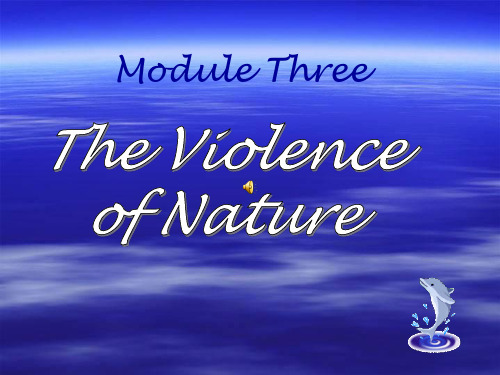
8th September, 1900
An extraordinary event
5.Who was Charles Coghlan?
He was a nineteenth-century Irish actor who went to live in Canada and died in Galveston.
Definition rotating, column of strong tropical
(定义)
air, thunderstorm storms
Phenomena violent winds
(现象)
Huge waves, heavy rain, and floods
Bad results
pick up; take off; furniture; deaths
d__i_s_a_s_t_e_r_
you can see these on a bird _f_e_a__th__e_r_s_
to place in the ground or tomb __b_u__r_y___
to happen
_o__c_c_u__r__
Fast reading
Article one
A. huge waves B. heavy rain C. thunderstorm D. floods
2.Why did Coghlan travel back to Canada” after his death?
In1900,Galveston; high waves; killed
had been killed,and and destroyed
外研版高中英语必修三Module3

单词1experience n. 经验;实践;经历;阅历v. 经历;经受;遭受;感受experienced adj. 有经验的;熟练的from/by experience 凭经验;从经验中(得出)be experienced in…在……方面有经验【易错警示】experience作“经验”讲是不可数名词,作“经历”讲是可数名词。
2cause n. 原因;动机;理由;根据;目标;理想;事业v. 引起;惹起;促成for a good cause为了正义的事业cause sb to do sth 促使某人做某事【词语辨析】cause和reason(1)cause 指“导致某事发生的原因或起因,常跟of搭配”。
如:We do not yet know the cause of the accident.我们尚不清楚事故的原因。
(2)reason 指“做某事的理由”,常跟for或why引导的定语从句搭配。
如:He has given no reasons for his decision.他并未说明他决定的理由。
【活学活用】(1)Tell me _______________you were so late this morning.告诉我今天上午你来这么晚的原因。
(2)______________________was carelessness.火灾的起因是粗心。
3occur v. 发生;出现;存在;浮现occurence n. 发生的事情,事件;发生;出现sth occur to sb 某事浮现在某人的脑海中;某人想到某事It occurs to sb that/It occurs to sb to do…某人想到……【短语辨析】take place, happen, occur, come about和breakout以上词或短语都含有“发生”的意思,区别如下:(1)take place表示“发生,举行,举办”,一般指非偶然性事件的发生,即这种事件的发生是由于某种原因或根据事先的安排。
外研版高一英语必修3 module3知识点总结及课后练习
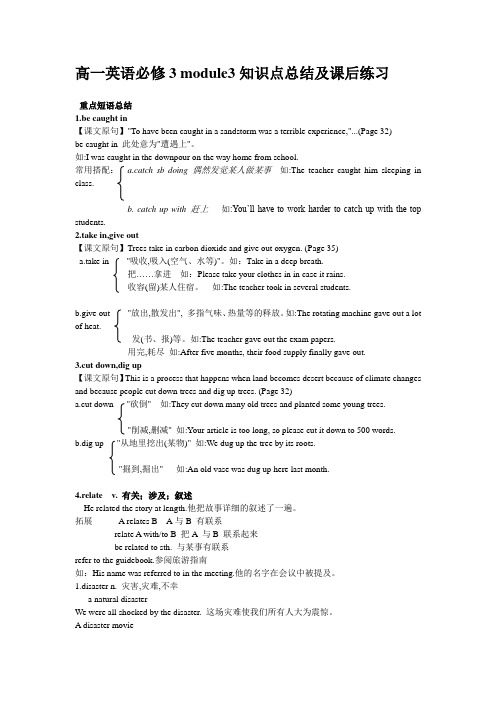
高一英语必修3 module3知识点总结及课后练习重点短语总结1.be caught in【课文原句】"To have been caught in a sandstorm was a terrible experience,"...(Page 32)be caught in 此处意为"遭遇上"。
如:I was caught in the downpour on the way home from school.常用搭配: a.catch sb doing 偶然发觉某人做某事如:The teacher caught him sleeping in class.b. catch up with 赶上如:You’ll have to work harder to catch up with the top students.2.take in,give out【课文原句】Trees take in carbon dioxide and give out oxygen. (Page 35)a.take in "吸收,吸入(空气、水等)"。
如:Take in a deep breath.把……拿进如:Please take your clothes in in case it rains.收容(留)某人住宿。
如:The teacher took in several students.b.give out "放出,散发出", 多指气味、热量等的释放。
如:The rotating machine gave out a lot of heat.发(书、报)等。
如:The teacher gave out the exam papers.用完,耗尽如:After five months, their food supply finally gave out.3.cut down,dig up【课文原句】This is a process that happens when land becomes desert because of climate changes and because people cut down trees and dig up trees. (Page 32)a.cut down "砍倒" 如:They cut down many old trees and planted some young trees."削减,删减" 如:Your article is too long, so please cut it down to 500 words.b.dig up "从地里挖出(某物)" 如:We dug up the tree by its roots."掘到,掘出" 如:An old vase was dug up here last month.4.relate v. 有关;涉及;叙述He related the story at length.他把故事详细的叙述了一遍。
外研版高中英语必修三Module3知识点详解与同步练习(含答案)
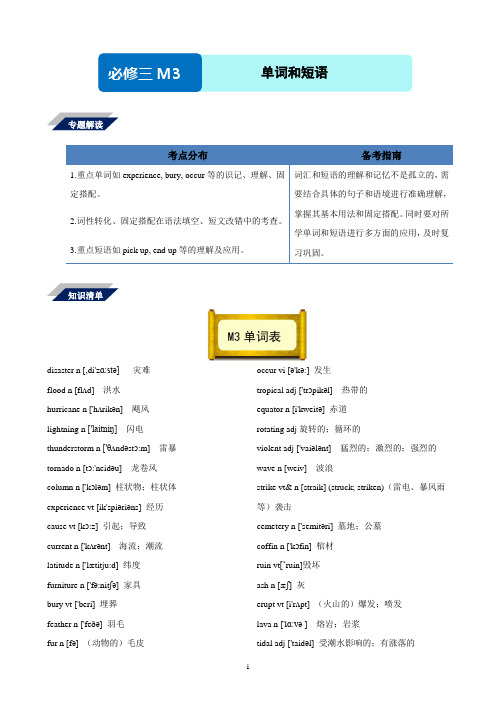
考点分布备考指南1.重点单词如experience, bury, occur等的识记、理解、固定搭配。
词汇和短语的理解和记忆不是孤立的,需要结合具体的句子和语境进行准确理解,掌握其基本用法和固定搭配。
同时要对所学单词和短语进行多方面的应用,及时复习巩固。
2.词性转化、固定搭配在语法填空、短文改错中的考查。
3.重点短语如pick up, end up等的理解及应用。
disaster n [,di'zɑ:stə] 灾难flood n [flʌd] 洪水hurricane n ['hʌrikən] 飓风lightning n ['laitniŋ] 闪电thunderstorm n ['θʌndəstɔ:m] 雷暴tornado n [tɔ:'neidəu] 龙卷风column n ['kɔləm] 柱状物;柱状体experience vt [ik'spiəriəns] 经历cause vt [kɔ:z] 引起;导致current n ['kʌrənt] 海流;潮流latitude n ['lætitju:d] 纬度furniture n ['fə:nitʃə] 家具bury vt ['beri] 埋葬feather n ['feðə] 羽毛fur n [fə] (动物的)毛皮occur vi [ə'kə:] 发生tropical adj ['trɔpikəl] 热带的equator n [i'kweitə] 赤道rotating adj旋转的;循环的violent adj ['vaiələnt] 猛烈的;激烈的;强烈的wave n [weiv] 波浪strike vt& n [straik] (struck; striken)(雷电、暴风雨等)袭击cemetery n ['semitəri] 墓地;公墓coffin n ['kɔfin] 棺材ruin vt[‘ruin]毁坏ash n [æʃ] 灰erupt vt [i'rʌpt] (火山的)爆发;喷发lava n ['lɑ:və ] 熔岩;岩浆tidal adj ['taidəl] 受潮水影响的;有涨落的专题解读知识清单单词和短语必修三M3M3单词表volcano n [vɔl'keinəu] 火山previous adj ['pri:vjəs] 以前的eruption n [i'rʌpʃən](火山的)爆发;喷发possibility n [,pɔsə'biləti] 可能;可能性earthquake n ['ə:θkweik] 地震terrifying adj ['tərifaiiŋ]吓人的;可怕的luckily adv ['lʌkili] 幸运地;幸亏thankfully adv ['θæŋkfulli] 感激地;满怀感谢地hopefully adv ['həupfuli] 满怀希望地;有希望地sadly adv ['sædli] 伤心地;不幸地fortunately adv ['fɔitʃənitli] 幸运地;幸亏warning n ['wɔ:niŋ] 警告worldwide adj ['wə:ld,waid] 全世界的active adj ['æktiv] 积极的;活跃的damage n& v ['dæmidʒ] 损失;损害M3短语pick up 卷起;掀起take off 去掉on average 平均起来end up 以……结束set fire to 放火(焚烧)……catch fire 着火put out 扑灭(火)take place 发生in all 总共;总计项目单词及其词性变化(语法填空必备)重点单词1.disaster n. 灾难2.cause vt. 引起;造成3.bury vt. 埋葬4.occur vi. 发生5.strike vt.& n. (雷电、暴风雨等)袭击6.ruin vt. 毁坏7.active adj. 积极的;活跃的8.damage n.& v. 损失;损害9.experience vt.经历→experienced adj.有经验的10.furniture n.家具→furnish vt.装备;配备11.violent adj.猛烈的;激烈的;强烈的→ violence n.暴力12.possibility n.可能;可能性→possible adj.可能的→impossible adj.不可能的13.terrifying adj.吓人的;可怕的→terrified adj.感到害怕的→terrify vt.使害怕14.luckily adv.幸运地;幸亏→lucky adj.幸运的→luck n.运气15.thankfully adv.感激地;满怀感谢地→thankful adj.感激的16.warning n.警告→warn v.警告重点短语1.pick_up卷起;掀起;拾起;接(某人);偶然学会;情况转好2.take_off 去掉;脱掉;起飞3.on_average 平均起来4.end_up 结果为……;以……结束5.set_fire_to 放火(焚烧)……6.catch_fire 着火7.put_out 扑灭(火);生产;制造8.take_place 发生,进行9.plenty_of 许多;大量10.in_all 总共;总计单元知识预览重点单词短语精讲1.experience vt.经历;体验n.经历;经验[教材原句]Do you know anyone who has experienced one of the events?你认识曾经经历过其中一种事件的人吗?experience in/of在……方面的经验by/from experience 通过经验,从经验中experienced adj. 有经验的;熟练的be experienced in 在……方面有经验[例句研读]①From/In my experience, there are three main reasons why people don't cook more often: ability, money, and time.根据我的经验看,人们不经常做饭主要有三个原因:能力、金钱和时间。
外研版必修三module3重点知识与练习

必修一module3Ⅰ、单词荟萃1.experience n、经验;经历v、经历,体验→ __________ adj、有经验得2、________ adj、暴力得→ violence n、暴力3.eruption n、喷发→ ______ v、喷发4、__________ n、可能→ possible adj、可能得→ _______ adv、可能地→ _________ adj、不可能得5、__________ adj、令人可怕得→ terrify v、使害怕→ ________ adj、害怕得6、 ______ adv、幸运地→ lucky adj、幸运得→ _______ n、幸运7.active adj、积极得→ ________ adv、积极地→ ________ n、积极,活动8.occur v、发生→ ________ 过去式→ ________ 过去分词→occurrence n、发生得事情;发生,出现9.strike v、袭击→ ______ 过去式→ ______ 过去分词10、 _________ adv、感激地→thankful adj、感激得11、 _________ adv、满怀希望地,有希望地→ hopeful adj、满怀希望得12、 _____ adv、伤心地,难过地→ sad adj、伤心得,难过得→ ______ n、伤心,难过Ⅱ、短语检测1.拿起;拾起;搭载;学会;收听2.平均3.有史以来4.到……时为止5.结束;告终6.扑灭7.放火烧……8.总共9.带来损害10.使某人无家可归pick upon averageof all timeby the timeend upput outset fire toin alldo/cause damage make sb、 homelessⅢ、佳句再现1.They can destroy houses, but leave the furniture inside exactly ___________、她们(龙卷风)能够毁坏房子,但就是房子里得家具却留在原地。
高中英语外研版新教材必修三Unit3重点单词词组语法总结
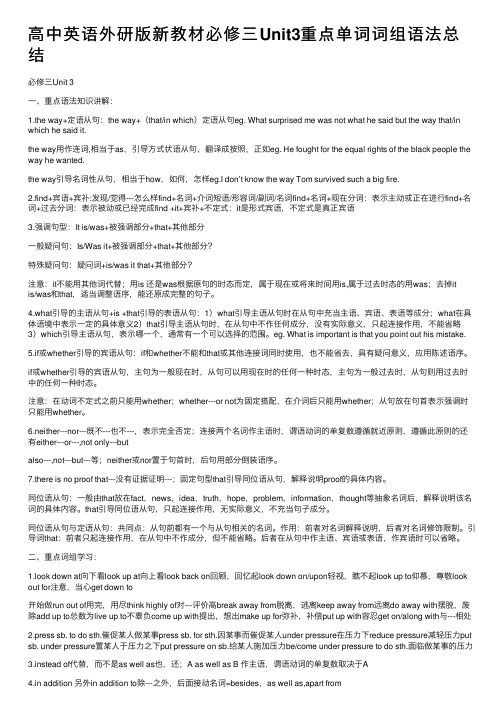
⾼中英语外研版新教材必修三Unit3重点单词词组语法总结必修三Unit 3⼀、重点语法知识讲解:1.the way+定语从句:the way+(that/in which)定语从句eg. What surprised me was not what he said but the way that/in which he said it.the way⽤作连词,相当于as,引导⽅式状语从句,翻译成按照,正如eg. He fought for the equal rights of the black people the way he wanted.the way引导名词性从句,相当于how,如何,怎样eg.I don’t know the way Tom survived such a big fire.2.find+宾语+宾补:发现/觉得---怎么样find+名词+介词短语/形容词/副词/名词find+名词+现在分词:表⽰主动或正在进⾏find+名词+过去分词:表⽰被动或已经完成find +it+宾补+不定式:it是形式宾语,不定式是真正宾语3.强调句型:It is/was+被强调部分+that+其他部分⼀般疑问句:Is/Was it+被强调部分+that+其他部分?特殊疑问句:疑问词+is/was it that+其他部分?注意:it不能⽤其他词代替;⽤is 还是was根据原句的时态⽽定,属于现在或将来时间⽤is,属于过去时态的⽤was;去掉itis/was和that,适当调整语序,能还原成完整的句⼦。
4.what引导的主语从句+is +that引导的表语从句:1)what引导主语从句时在从句中充当主语、宾语、表语等成分;what在具体语境中表⽰⼀定的具体意义2)that引导主语从句时,在从句中不作任何成分,没有实际意义,只起连接作⽤,不能省略3)which引导主语从句,表⽰哪⼀个,通常有⼀个可以选择的范围。
最新外研版必修三module3重点知识与练习

精品文档必修一module3Ⅰ.单词荟萃1.experience n. 经验;经历v. 经历,体验→ __________ adj. 有经验的2. ________ adj. 暴力的→ violence n. 暴力3.eruption n. 喷发→ ______ v. 喷发4. __________ n. 可能→ possible adj. 可能的→ _______ adv. 可能地→ _________ adj. 不可能的5. __________ adj. 令人可怕的→ terrify v. 使害怕→ ________ adj. 害怕的6. ______ adv. 幸运地→ lucky adj. 幸运的→ _______ n. 幸运7.active adj. 积极的→ ________ adv. 积极地→ ________ n. 积极,活动8.occur v. 发生→ ________ 过去式→ ________ 过去分词→occurrence n. 发生的事情;发生,出现9.strike v. 袭击→ ______ 过去式→ ______ 过去分词10. _________ adv.感激地→thankful adj. 感激的11. _________ adv. 满怀希望地,有希望地→ hopeful adj. 满怀希望的12. _____ adv. 伤心地,难过地→ sad adj. 伤心的,难过的→ ______ n. 伤心,难过Ⅱ.短语检测1.拿起;拾起;搭载;学会;收听2.平均3.有史以来4.到……时为止5.结束;告终6.扑灭7.放火烧……8.总共9.带来损害10.使某人无家可归pick upon averageof all timeby the timeend upput outset fire toin alldo/cause damage make sb. homelessⅢ.佳句再现1.They can destroy houses, but leave the furniture inside exactly ___________.他们(龙卷风)能够毁坏房子,但是房子里的家具却留在原地。
必修3 Module 3外研社高中英语必修三单元三各知识点

on average _________
end up ______
7. 放火(焚烧)„„ 8. 着火 9. 扑灭(火) 10. 翻过来;翻阅(书页) 11. 发生 12. 总共; 总计
set fire to _________
catch fire ________
put out _______ turn over ________
【品词自测】根据所给词的适当形式填空 experience ①The train accident is really the most unforgettable _________ experienced in his life. (experience) he has ever___________
take place _________
in all ______
Ⅲ. 句式扫描
leave the furniture inside 1. They can destroy houses, but _________________________ exactly where it was 把里面的家具留在原处). __________________( 2. On average, there are 800 tornadoes in the US each year, causing about 80 deaths and 1, 500 injuries 造成大约80人死亡, ______________________________________( 1 500人受伤). By the time it ended 到风停时), more than 700 people had 3. ___________________(
外研版高中英语必修三Module3知识点详解与同步练习(含答案)

考点分布备考指南1.重点单词如experience, bury, occur等的识记、理解、固定搭配。
词汇和短语的理解和记忆不是孤立的,需要结合具体的句子和语境进行准确理解,掌握其基本用法和固定搭配。
同时要对所学单词和短语进行多方面的应用,及时复习巩固。
2.词性转化、固定搭配在语法填空、短文改错中的考查。
3.重点短语如pick up, end up等的理解及应用。
disaster n [,di'zɑ:stə] 灾难flood n [flʌd] 洪水hurricane n ['hʌrikən] 飓风lightning n ['laitniŋ] 闪电thunderstorm n ['θʌndəstɔ:m] 雷暴tornado n [tɔ:'neidəu] 龙卷风column n ['kɔləm] 柱状物;柱状体experience vt [ik'spiəriəns] 经历cause vt [kɔ:z] 引起;导致current n ['kʌrənt] 海流;潮流latitude n ['lætitju:d] 纬度furniture n ['fə:nitʃə] 家具bury vt ['beri] 埋葬feather n ['feðə] 羽毛fur n [fə] (动物的)毛皮occur vi [ə'kə:] 发生tropical adj ['trɔpikəl] 热带的equator n [i'kweitə] 赤道rotating adj旋转的;循环的violent adj ['vaiələnt] 猛烈的;激烈的;强烈的wave n [weiv] 波浪strike vt& n [straik] (struck; striken)(雷电、暴风雨等)袭击cemetery n ['semitəri] 墓地;公墓coffin n ['kɔfin] 棺材ruin vt[‘ruin]毁坏ash n [æʃ] 灰erupt vt [i'rʌpt] (火山的)爆发;喷发lava n ['lɑ:və ] 熔岩;岩浆tidal adj ['taidəl] 受潮水影响的;有涨落的专题解读知识清单单词和短语必修三M3M3单词表volcano n [vɔl'keinəu] 火山previous adj ['pri:vjəs] 以前的eruption n [i'rʌpʃən](火山的)爆发;喷发possibility n [,pɔsə'biləti] 可能;可能性earthquake n ['ə:θkweik] 地震terrifying adj ['tərifaiiŋ]吓人的;可怕的luckily adv ['lʌkili] 幸运地;幸亏thankfully adv ['θæŋkfulli] 感激地;满怀感谢地hopefully adv ['həupfuli] 满怀希望地;有希望地sadly adv ['sædli] 伤心地;不幸地fortunately adv ['fɔitʃənitli] 幸运地;幸亏warning n ['wɔ:niŋ] 警告worldwide adj ['wə:ld,waid] 全世界的active adj ['æktiv] 积极的;活跃的damage n& v ['dæmidʒ] 损失;损害M3短语pick up 卷起;掀起take off 去掉on average 平均起来end up 以……结束set fire to 放火(焚烧)……catch fire 着火put out 扑灭(火)take place 发生in all 总共;总计项目单词及其词性变化(语法填空必备)重点单词1.disaster n. 灾难2.cause vt. 引起;造成3.bury vt. 埋葬4.occur vi. 发生5.strike vt.& n. (雷电、暴风雨等)袭击6.ruin vt. 毁坏7.active adj. 积极的;活跃的8.damage n.& v. 损失;损害9.experience vt.经历→experienced adj.有经验的10.furniture n.家具→furnish vt.装备;配备11.violent adj.猛烈的;激烈的;强烈的→ violence n.暴力12.possibility n.可能;可能性→possible adj.可能的→impossible adj.不可能的13.terrifying adj.吓人的;可怕的→terrified adj.感到害怕的→terrify vt.使害怕14.luckily adv.幸运地;幸亏→lucky adj.幸运的→luck n.运气15.thankfully adv.感激地;满怀感谢地→thankful adj.感激的16.warning n.警告→warn v.警告重点短语1.pick_up卷起;掀起;拾起;接(某人);偶然学会;情况转好2.take_off 去掉;脱掉;起飞3.on_average 平均起来4.end_up 结果为……;以……结束5.set_fire_to 放火(焚烧)……6.catch_fire 着火7.put_out 扑灭(火);生产;制造8.take_place 发生,进行9.plenty_of 许多;大量10.in_all 总共;总计单元知识预览重点单词短语精讲1.experience vt.经历;体验n.经历;经验[教材原句]Do you know anyone who has experienced one of the events?你认识曾经经历过其中一种事件的人吗?experience in/of在……方面的经验by/from experience 通过经验,从经验中experienced adj. 有经验的;熟练的be experienced in 在……方面有经验[例句研读]①From/In my experience, there are three main reasons why people don't cook more often: ability, money, and time.根据我的经验看,人们不经常做饭主要有三个原因:能力、金钱和时间。
高中英语外研版必修三MODULE 3 单元语法精讲精练---连词

• 高考直击
• (1)(2008·重庆·33)All people,
________ they are old or young, B
rich or poor, have been trying
their best to help those in need
matter与however语法上不对。
Байду номын сангаас
D • (2)(2008·辽宁·28)________ hungry I am, I never seem to be able to finish off this loaf of bread. • A.Whatever B.Whenever • C.Wherever D.However
will save us money in the long
run.
• A.or
• C.for
B.since
D.but
• ②Uncle Jim is a shy man,
______he is not afraid of B
anything or anyone.
• A.and
B.but
• C.then D.therefore
• D 考查连词用法。whenever无 论何时;though尽管; for因为; while当……时候。句意:这太不 公平了,上个月当我在作侍者时, 我的朋友们却躺在海滩上。
• 即学即用
• ①The changes in the city will cost quite a lot,______they D
• Ⅲ.单元语法精讲精练---连词
外研版必修三module3(含答案)
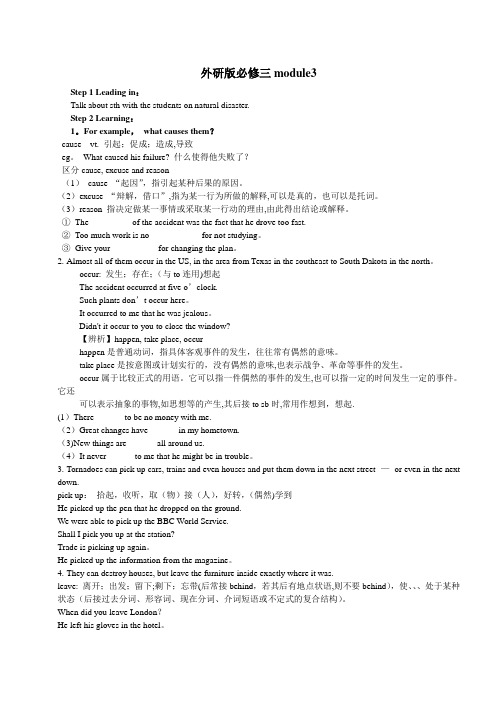
外研版必修三module3Step 1 Leading in:Talk about sth with the students on natural disaster.Step 2 Learning:1。
For example,what causes them?cause vt. 引起;促成;造成,导致eg。
What caused his failure? 什么使得他失败了?区分cause, excuse and reason(1)cause “起因”,指引起某种后果的原因。
(2)excuse “辩解,借口”,指为某一行为所做的解释,可以是真的,也可以是托词。
(3)reason 指决定做某一事情或采取某一行动的理由,由此得出结论或解释。
①The _________ of the accident was the fact that he drove too fast.②Too much work is no ___________ for not studying。
③Give your __________ for changing the plan。
2.Almost all of them occur in the US, in the area from Texas in the southeast to South Dakota in the north。
occur: 发生;存在;(与to连用)想起The accident occurred at five o’clock.Such plants don’t occur here。
It occurred to me that he was jealous。
Didn't it occur to you to close the window?【辨析】happen, take place, occurhappen是普通动词,指具体客观事件的发生,往往常有偶然的意味。
外研必修三module3知识点剖析课件

通过课文中对不同节日的介绍和描述,我们可以深入了解不同国家和地区的文化传统和价值观,以及 人类文明的发展历程。
启示
课文告诉我们,节日不仅是人们欢聚一堂、共度时光的时刻,更是传承文化、弘扬价值观的重要载体 。我们应该珍惜和传承这些宝贵的文化遗产,同时也要理解和尊重不同国家和地区的文化差异。
REPORT
教学目标
01
02
03
知识目标
学生能够掌握与语言和文 化相关的基本概念和理论 。
能力目标
学生能够运用所学知识分 析语言和文化现象,提高 跨文化交流的能力。
情感态度价值观
培养学生对不同文化的尊 重和包容态度,增强跨文 化交流的信心。
教学内容概览
语言与文化的关系
介绍语言与文化的基本概念和 关系,包括语言的文化背景、
文化内涵等。
跨文化交流
探讨跨文化交流的基本概念、 原则和方法,以及语言在跨文 化交流中的作用。
案例分析
通过分析具体的语言和文化现 象,让学生深入理解语言与文 化的关系以及跨文化交流的技 巧。
实践活动
设计一些跨文化交流的实践活 动,让学生亲身体验和实践跨
文化交流的技巧。
REPORT
CATALOG
DATE
REPORT
CATALOG
DATE
ANALYSIS
SUMMAR Y
05
学习策略和建议
学习方法和技巧
制定学习计划
制定详细的学习计划,合 理分配时间,确保每个知 识点都能得到充分的复习 。
主动学习
积极参与课堂讨论,主动 提问,及时解决疑惑,提 高学习效果。
多样化学习方式
采用多种学习方式,如阅 读、听讲、实践等,以提 高学习效率。
外研社版必修三Module3知识点

Module3知识点一.occur/happen/take place/break out 1.It _____ to me that I should treat myself a dinner after such an exhausting examination.A. happened B. struck C. occurred D. took 2. It suddenly ______ to her that Tom was afraid of being alone.The accident _______ yesterday. Someone in the street ______ to know her. The meeting _______ at 8:00 as planned. That idea never ______ to me. A fire ______ during the night. 二.pick up 1. Sam ______ some knowledge of the computer just by watching others working on it. A. brought up B. looked up C. pocked up D. set up 2. Zhangliang picked up the shoes for the old man again. The bus stopped to pick up the passengers. He picked up French very quickly when he was traveling in France. My radio can pick up BBC English and VOA easily.We’re waiting until the weather picks up a bit. Under good treatment, Linda is beginning to pick up and will soon recover. 三.damage/destroy/ruin damage 非毁灭性的损害,多指使外观改变、功能受损。
最新外研版必修三ModulePeriod-3课后阅读训练含解析

学习-----好资料课后阅读作业十五Module 4 Period 3I •阅读理解Most of the san dstorms that had swept Chi na last year came from foreign land, a Chinese official in charge of desertification control said on Mon day. And the inv asi on s 入侵)could partly expla in the freque nt sandstorms in the country in recent years despite its achievements in desertification control.Since the start of last spring, the northern and northwesternChin ese regi ons had bee n hit by 17 san dstorms, of which, a doze n came from foreig n land.Situated in the central-Asia sandstorm region, one of the world'sfour largest san dstorm sources, Chi na also suffers from san dstorms from outside the country while being blamed as a sand source to n ortheast Asia. The other three major sources are in Africa, North America and Australia. The land suffer ing from desertificati on has bee n decreas ing by 7,—585 square kilometres annually in China, and the area of sandy land has also bee n falli ng by 1,284 square kilometres a year.The shri nkage 收缩)forms a clear con trast to the fact that the land suffering from desertificati on and sandy feature was added by 10, 400 square kilometres and 3, 436 square kilometres late last century, 更多精品文档.学习--- 好资料respectively.Currently, the desertification land in China makes up 2. 64 million square kilometres, accounting for 27. 46 percent of the nation's land, and its sandy land totals 1. 74 million square kilometres, accounting for 18. 1 percent of the country's total.【语篇概述】本文主要讲了中国遭受沙尘暴侵袭, 通过治理在控制沙漠化方面取得了一定成效。
外研社必修三Module3知识点

• strike(struck; struck/striken) • ①敲击Strike the iron while it’s hot • strike sb on the head • ②钟敲响报时The clock struck 12 • ③ 罢工(n) be/go on strike零冠词 • ④ 想起 • It strikes/occurs to sb that 从句 • An idea strikes/ occurs to me
(2)动词think, want, hope, mean, plan, intend等用过去完 成时来表示过去未曾实现的想法, 希望,打算或意图等。 • They had wanted to help but could not get there in time. • We had hoped to be able to come and see you .
• 【经典考例】I was giving a talk to a large group of people, the same talk I _____ to half a dozen other groups. • A. was giving B. am giving • C. had given D. have given • 解析:C 判断是否用过去完成时关键 看动作是否发生在另外一个已经发生 的动作之前。
• 【经典考例】The young girl sitting next to me on the plane was very nervous. She ______ before. • A. hasn't flown B. didn't fly • C. hadn't flown D. wasn't flying • 解析:答案为C。该题考查动词时态。 动作发生在“过去的过去”,所以用 过去完成时。
- 1、下载文档前请自行甄别文档内容的完整性,平台不提供额外的编辑、内容补充、找答案等附加服务。
- 2、"仅部分预览"的文档,不可在线预览部分如存在完整性等问题,可反馈申请退款(可完整预览的文档不适用该条件!)。
- 3、如文档侵犯您的权益,请联系客服反馈,我们会尽快为您处理(人工客服工作时间:9:00-18:30)。
必修一module3Ⅰ.单词荟萃1.experience n. 经验;经历v. 经历,体验→ __________ adj. 有经验的2. ________ adj. 暴力的→ violence n. 暴力3.eruption n. 喷发→ ______ v. 喷发4. __________ n. 可能→ possible adj. 可能的→ _______ adv. 可能地→ _________ adj. 不可能的5. __________ adj. 令人可怕的→ terrify v. 使害怕→ ________ adj. 害怕的6. ______ adv. 幸运地→ lucky adj. 幸运的→ _______ n. 幸运7.active adj. 积极的→ ________ adv. 积极地→ ________ n. 积极,活动8.occur v. 发生→ ________ 过去式→ ________ 过去分词→occurrence n. 发生的事情;发生,出现9.strike v. 袭击→ ______ 过去式→ ______ 过去分词10. _________ adv.感激地→thankful adj. 感激的11. _________ adv. 满怀希望地,有希望地→ hopeful adj. 满怀希望的12. _____ adv. 伤心地,难过地→ sad adj. 伤心的,难过的→ ______ n. 伤心,难过Ⅱ.短语检测1.拿起;拾起;搭载;学会;收听2.平均3.有史以来4.到……时为止5.结束;告终6.扑灭7.放火烧……8.总共9.带来损害10.使某人无家可归pick upon averageof all timeby the timeend upput outset fire toin alldo/cause damage make sb. homelessⅢ.佳句再现1.They can destroy houses, but leave the furniture inside exactly ___________.他们(龙卷风)能够毁坏房子,但是房子里的家具却留在原地。
2. __________, there are 800 tornadoes in the US each year, causing about 80 deaths and 1, 500 injured.平均来说,美国每年发生800次龙卷风,造成大约80人死亡, 1500人受伤。
3.The worst tornado ________________ in 1925, ________ three US states: Missouri, Illinois and Indiana.历史上最严重的龙卷风发生于1925年,影响了美国三个州:密苏里州、伊利诺斯州和印第安纳州。
4. __________it ended, more than 700 people ______________ and 2, 700 _______________.等到风停时,已有700多人死亡, 2700多人受伤。
5.The fires burned for three days, __________ a total of 25, 000 buildings.大火持续了三天,烧毁了25000座建筑。
Ⅳ.词汇学习1experience n. 经验;经历v. 经历;遭受(1) experienced adj. 有经验的;熟练的(2) from/by experience 凭经验;从经验中(得出)be experienced in 在……方面有经验【温馨提示】experience作“经验”讲是不可数名词,作“经历”讲是可数名词。
【活学活用】(1) Mr Brown has _________________ in teaching.布朗先生有丰富的教学经验。
(2) Yesterday afternoon I had __________________.昨天下午,我遭遇了一次可怕的经历。
(3) Everyone _______________________ at some time in their lives.每个人在人生的某个阶段都会经历这些问题。
2cause n. 原因,起因;事业v. 引起,导致for a good cause为了正义的事业cause sb. to do sth. 促使某人做某事【易混辨析】cause和reason(1)cause 指“导致某事发生的原因或起因”,常跟of搭配。
如:We do not yet know the cause of the accident. 我们尚不清楚事故的原因。
(2)reason 指“做某事的理由”,常跟for或why引导的定语从句搭配。
He has given no reasons for his decision. 他并未说明他决定的理由。
【活学活用】(1)Tell me ______________ you were so late this morning.告诉我今天上午你来这么晚的原因。
(2) _________________ was carelessness. 火灾的起因是粗心。
3occur v. 发生;(come int o one’s mind)(想法、念头等)出现(1) occurrence n. 发生的事情、事件;发生;出现(2) sth. occur to sb. 某事浮现在某人的脑海中;某人想到某事It occurs to sb. that/It occurs to sb. to do…某人想到……【易混辨析】take place, happen, occur, come about和break out以上词或短语都含有“发生”的意思,区别如下:(1)take place表示“发生,举行,举办”,一般指非偶然性事件的发生,即这种事件的发生是由于某种原因或根据事先的安排。
(2)happen作“发生”讲,一般用于偶然或突发性事件。
另外还可以表示“碰巧”。
常用于搭配:happen to do sth./It happens that…(3)occur作“发生”讲,其意义相当于happen, 但它还可以表示“想到,突然想起”。
(4)come about表示“发生,产生”,多指事情已经发生了,但还不知道为什么,常用于疑问句和否定句。
可以构成句型:How did it come about that…?……是怎么发生的?(5)break out意为“发生,爆发”,常指战争、灾难、疾病或者争吵等事件的发生,也可以表示突然大声叫喊等。
【温馨提示】上面表示“发生”的五个词或短语,都是不及物动词。
其主语都是事情、事件等。
【活学活用】(1) The 28th Olympic Games _________ in Beijing. 第28届奥运会在北京举行。
(2) How did it __________that he knew where we were?他是怎么知道我们在什么地方的呢?(3) Should another world war ________, what would become of human beings?万一另一次世界大战爆发,人类将会发生什么事?(4) I __________________on my way home.= _______________ I saw him on my way home. 我碰巧在回家的路上见到了他。
(5) ________________ that you may be wrong?你有没有想到过你有可能是错的?4 ruin v. (使)破产;(使)堕落;毁灭n. 毁灭;废墟in ruins成为废墟 go/fall/come to ruin 毁灭;崩溃;破坏掉【易混辨析】ruin, damage, destroy和harm(1) ruin 一般指对物体或生命彻底的破坏,但往往是非暴力的,也往往不是一次性打击的结果,常指对美好的或希望中的事物的破坏。
(2) damage 一般指对物体或生命的局部损伤,使整体的价值或作用降低或变得无价值、无作用。
它既可作名词,也可作动词。
作名词时常构成搭配:cause/do damage (to…)(对……)造成损害。
(3) destroy 往往指对某物体进行完全的毁坏,使之无法恢复。
(4) harm 一般指伤害有生命的东西,常指伤及人的健康、权利、事业等。
What he faced ruined his hope. 他所面对的使他的希望破灭了。
The whole city was destroyed in the earthquake. 整个城市在地震中被毁掉了。
We wanted to have a look at the ruins of Pompeii. 我们想看一下庞贝城的废墟。
They managed to repair the houses that had been damaged.他们设法修复了受到破坏的房子。
【活学活用】用ruin, damage或destroy的适当形式填空(1)The rain caused great ________ to the crops.(2)The building was completely ________ in the fire.(3)She poured water all over my painting, and ________ it.5strike v. 打;碰撞; (突然)袭击;突然想到;让(某人)觉得,留下……印象;擦(火柴);钟敲响n. 罢工It strikes me that…某人突然想到/意识到…… be deeply struck 被深深打动strike sb. as… 让某人觉得…… be on strike 在罢工go on strike 举行罢工【易混辨析】strike, hit和beat(1) strike指用力地“打击”,表示短暂的动作,含有急速的或突然的一次性的殴打、打击或敲击,是普通用词,有时与hit通用,并用于比喻意义。
(2) hit 指“打”时,侧重于对某一点“打中,击中”,或有目的地打,表结果。
(3) beat 指“连续殴打,击败”,也指心脏的“跳动”。
【活学活用】1. 根据语境判断strike在下列句中的含义(1)The plan strikes me as ridiculous. ___________(2)His knee struck against the chair. ________(3)It was dark in the room so he struck a match. ________(4)An earthquake struck this area last year. ________(5)A good idea struck me and I decided to go abroad. ________2. 用beat, hit或strike的适当形式填空(1)When she heard the bad news, her heart _____ fast.(2)They left the house when the clock ______ twelve.(3)I was deeply ______ by the beauty of the country.(4)It ______ me that there was no one at home.(5)A bullet ___ him on the leg.Ⅴ短语学习1set fire to放火烧……;使……燃烧set… on fire 放火烧;使燃烧 catch fire着火;起火be on fire燃烧着 make a fire生火put out fire 扑火 play with fire 冒大风险;玩火【活学活用】(1)It took firemen several hours ________________ (扑灭火).(2)It seems that something ______________ (已经着火).(3)The house _______ (在燃烧).(4)Anyone who _________ (放火烧) the building can’t escape punishment.2take place发生;举行t ake sb.’s place/take the place of 代替;接替in place of 代替 in place在正确的位置;适当out of place 在错误的位置;在不适当的位置in sb.’s place 处于某人的位置【活学活用】(1)The contest __________ every four years. 该赛事每4年举行一次。
